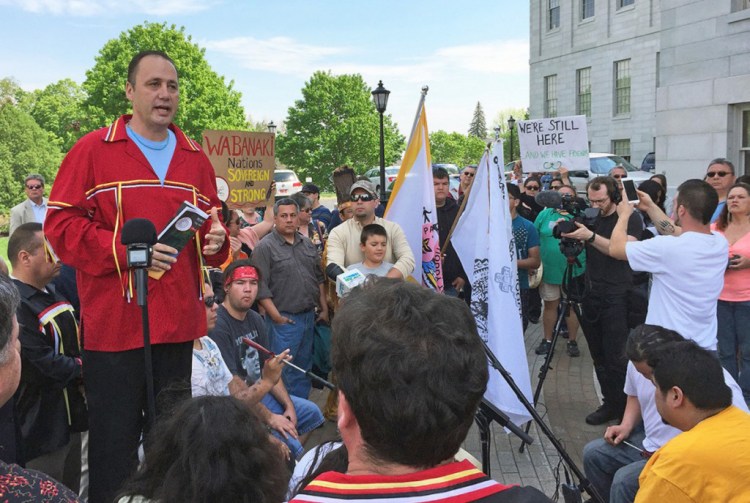May 26, 2015: The Penobscot Nation and the Passamaquoddy Tribe withdraw their nonvoting representatives to the Maine Legislature, saying state policies fail to respect the tribes’ sovereignty, deny members sustenance fishing rights and ignore tribal culture.

The Penobscots’ Rep. Wayne Mitchell and Rep. Matthew Dana, of the Passamaquoddys, walk out of the House of Representatives chamber, saying the state tries to deal with their tribes the way a guardian treats a ward.
“Our hope is that one day the state will recognize us for who we are and value the tribes as sovereign partners and engage in a relationship of mutual respect,” Dana says. “Until then, we must simply decide our own future. If history has taught us anything, it certainly is that lesson.”
Gov. Paul LePage’s office said the tribes have not been cooperative in working with the state or each other.
The Houlton Band of Maliseet tribe’s representative retains a House seat.
In 2016, the Penobscots widen the gulf further, terminating the 150-year-old arrangement under which its group is represented at the State House. Penobscot Chief Wayne Francis says the Penobscots want to convert their discussion with Maine’s government, or any other government, to something more like nation-to-nation talks.
“The idea that stuck the most with everyone has been to create an ambassador of the tribe,” he tells a Maine Public reporter. Afterward, the Penobscots do exactly that.
The Passamaquoddys, on the other hand, change their minds. They send a representative to the Legislature again in 2017, and they still have one there in 2020.
Then the Maliseets’ chief, Clarissa Sabattis, elected in 2017, sends a letter on Nov. 28, 2018, notifying the Legislature that her tribe will not send a representative for the 2019-2020 Legislature. The letter gives no explanation for the decision.
“Basically, we were finding that the relationship really wasn’t working the way it was built,” Sabattis, of Houlton, says in a Jan. 23, 2020, phone interview. She notes that the Maliseet representative, like the other tribal delegates, was not allowed to vote. “It was just a token seat at the Legislature.”
Sabattis says she spends a lot of time at the State House representing the tribe’s interests as chief. The old arrangement perpetuated a paternalistic system, she says. Now the tribe, which consists of about 800 members in Aroostook County and 1,000 elsewhere, is weighing whether to set up an ambassadorial arrangement similar to that of the Penobscots.
The multi-year dust-up reflects other tension at the local level. Around the time the tribes begin reconsidering their representative in Augusta, some tribes’ members visit Skowhegan several times to convince the local school board to stop using “Indians” as the nickname for the school district’s team names and to withdraw all the associated Indian imagery.
After years of conflict about the issue, the school board eventually complies in March 2019, despite much local opposition.
Presented by:

Joseph Owen is an author, retired newspaper editor and board member of the Kennebec Historical Society. Owen’s book, “This Day in Maine,” can be ordered at islandportpress.com. Tune in as he’s interviewed by Bill Nemitz in our Maine Voices Live series Tuesday, May 26, at 7 p.m. Joe can be contacted at: jowen@mainetoday.com.
Send questions/comments to the editors.



Comments are no longer available on this story